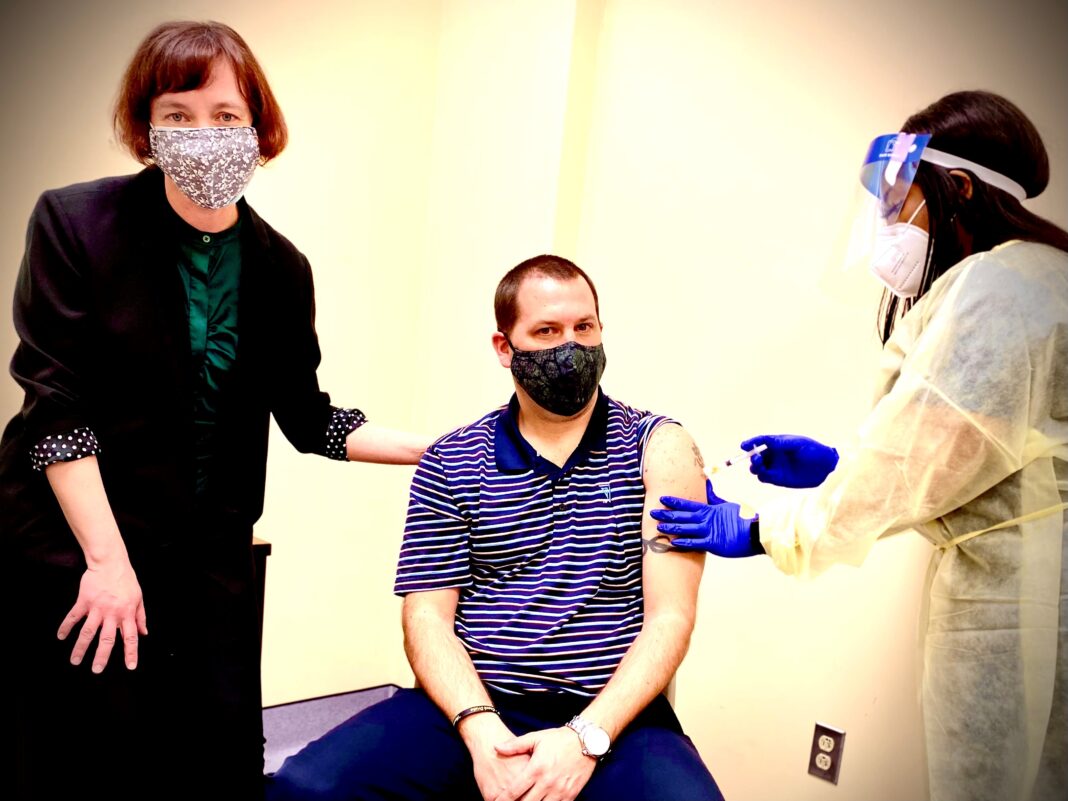As Mercedes Campbell, LPN administered the second dose of the Moderna vaccine to Barrett Young, chief executive officer of The Mission, Dr. Rachael Evans, chief medical officer at Henry J. Austin Health Center explained that the second dose of this mRNA vaccine has been shown to be approximately 95 percent effective in preventing symptomatic Covid-19 disease, which she described as “remarkable, almost borderline historic.”
The second dose, administered 28 days after the first, increases efficacy from about 80 percent to 95 percent. “The first dose of the vaccine is designed to train your body to recognize the virus and ramp up the immune system, your body’s defense against disease,” Dr. Evans explained. “The second dose is designed to strengthen your immune response. Ultimately, what that means is that in the unlikely chance that someone who is vaccinated becomes infected with the virus, the symptoms will be mild-to-moderate, rather than needing to be hospitalized. That is huge,” she added.
“All of the individuals working at The Mission’s Shelter and Behavioral Health Center have been offered the opportunity to receive the inoculation,” Young said. “When Dr. Evans said it was available, I wanted to be among the first in line to show how vital it is for all of us to take advantage of this huge opportunity.”
He continued, “While I know that some people, for various reasons, are hesitant to get the vaccine, Dr. Evans said that until 70 percent of us are vaccinated, we will still need to be practicing universal precautions – wearing masks, washing hands frequently and keeping socially distant. If we want to get on the other side of this pandemic, we need to be in this together and sign-up to get vaccinated. We have come too far and suffered too much not take advantage of this enormous opportunity.”
Dr. Evans added, “I am hopeful, as more and more individuals get vaccinated, that any mistrust, misunderstandings and fears about the vaccine will dissipate. For those individuals who are concerned about being vaccinated, as they see more and more of their friends and family get vaccinated, I believe there will be s shift.”
She added, “Right now, my biggest concern is that the supply is still far too limited – and has not met the demand. Unfortunately, the rollout has been unpredictable from week-to-week. So, we have not been able to plan more than a few days ahead. In the last three weeks, we have seen improvements, which makes me hopeful.”
She continued, “We need to increase the supply of vaccines, so we are able to expand the number of people who can get vaccinated – particularly those in our community who are most vulnerable. Once the supply of vaccines increases, I believe we will experience a profound transformation.”
The Mission and the Henry J. Austin Center have been collaborating on a daily basis to address some of the daunting challenges we have faced since March of last year – including initiating telehealth calls, testing on an ongoing basis, getting immediate treatment for anyone who exhibits symptoms and isolating anyone who needs to be quarantined.
Young emphasized, “The vaccines are that light that has been at the end of this long tunnel we have all been traveling through. Getting vaccinated is one of the most important things we can do – for ourselves and for those we love, and until we are on the other side of this, we cannot let our guard down. Wear masks, keep socially distant, wash your hands frequently, refrain from large gatherings – and get vaccinated. Hope is around the corner.”





